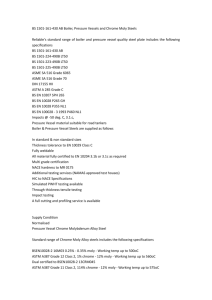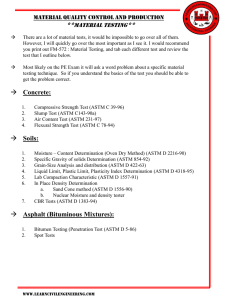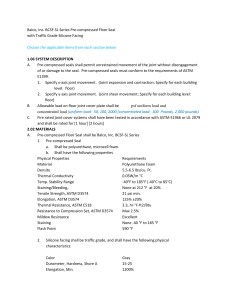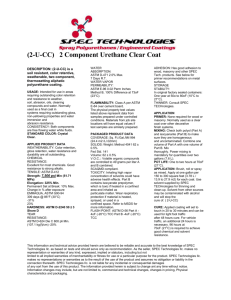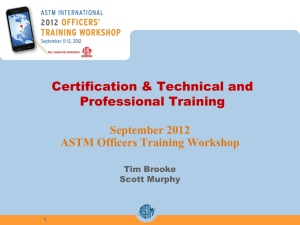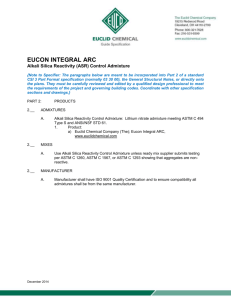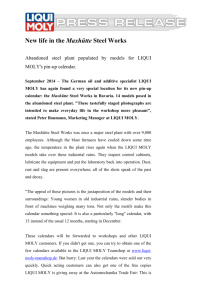#160 MOLY SLIDE & WAY LUBE
advertisement
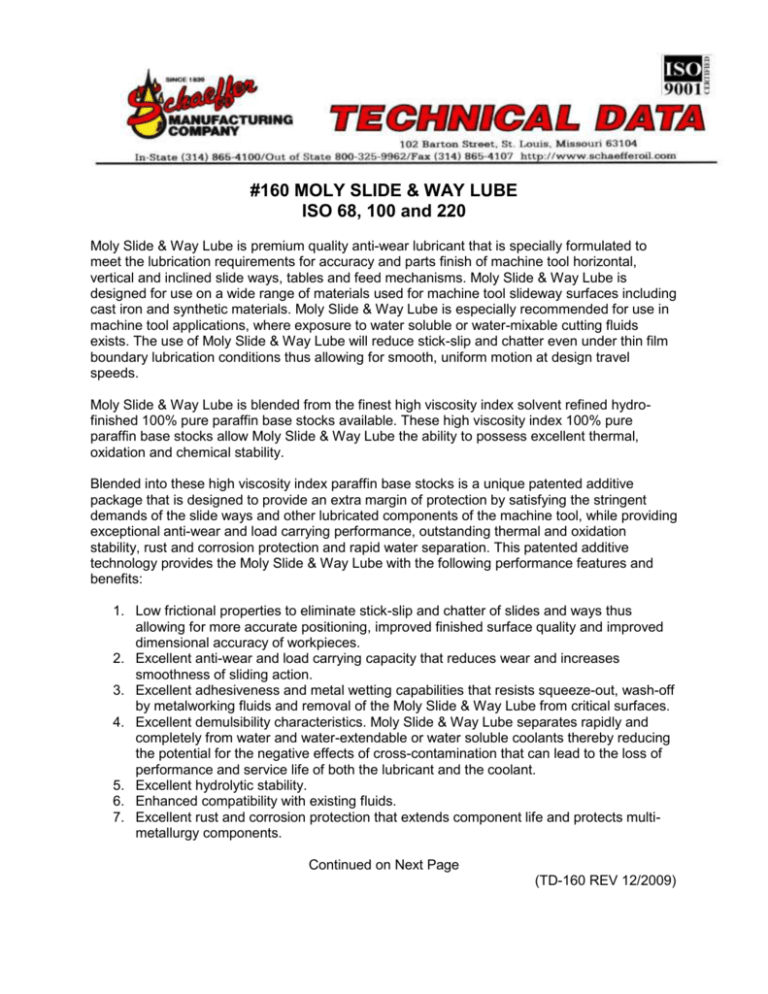
#160 MOLY SLIDE & WAY LUBE ISO 68, 100 and 220 Moly Slide & Way Lube is premium quality anti-wear lubricant that is specially formulated to meet the lubrication requirements for accuracy and parts finish of machine tool horizontal, vertical and inclined slide ways, tables and feed mechanisms. Moly Slide & Way Lube is designed for use on a wide range of materials used for machine tool slideway surfaces including cast iron and synthetic materials. Moly Slide & Way Lube is especially recommended for use in machine tool applications, where exposure to water soluble or water-mixable cutting fluids exists. The use of Moly Slide & Way Lube will reduce stick-slip and chatter even under thin film boundary lubrication conditions thus allowing for smooth, uniform motion at design travel speeds. Moly Slide & Way Lube is blended from the finest high viscosity index solvent refined hydrofinished 100% pure paraffin base stocks available. These high viscosity index 100% pure paraffin base stocks allow Moly Slide & Way Lube the ability to possess excellent thermal, oxidation and chemical stability. Blended into these high viscosity index paraffin base stocks is a unique patented additive package that is designed to provide an extra margin of protection by satisfying the stringent demands of the slide ways and other lubricated components of the machine tool, while providing exceptional anti-wear and load carrying performance, outstanding thermal and oxidation stability, rust and corrosion protection and rapid water separation. This patented additive technology provides the Moly Slide & Way Lube with the following performance features and benefits: 1. Low frictional properties to eliminate stick-slip and chatter of slides and ways thus allowing for more accurate positioning, improved finished surface quality and improved dimensional accuracy of workpieces. 2. Excellent anti-wear and load carrying capacity that reduces wear and increases smoothness of sliding action. 3. Excellent adhesiveness and metal wetting capabilities that resists squeeze-out, wash-off by metalworking fluids and removal of the Moly Slide & Way Lube from critical surfaces. 4. Excellent demulsibility characteristics. Moly Slide & Way Lube separates rapidly and completely from water and water-extendable or water soluble coolants thereby reducing the potential for the negative effects of cross-contamination that can lead to the loss of performance and service life of both the lubricant and the coolant. 5. Excellent hydrolytic stability. 6. Enhanced compatibility with existing fluids. 7. Excellent rust and corrosion protection that extends component life and protects multimetallurgy components. Continued on Next Page (TD-160 REV 12/2009) TD-160 Page 2 8. Excellent filterability in both wet and dry conditions. 9. Excellent protection against the formation and build-up of varnish and sludge deposits. 10. Enhanced thermal and oxidation stability. 11. Excellent machine cleanliness. 12. Excellent anti-foaming and air release properties 13. Excellent fluid quality reserve to maintain its performance features even under severe service conditions and extended drain intervals. 14. Enhanced fluid service life. 15. Enhanced seal life. 16. Reduced system maintenance. The trend by machine tool OEMs is to employ higher speeds, higher pressures, increased feed and cycling times and increased power output, while minimizing the oil reservoir size in order to make the systems more compact. These trends coupled with higher oil flow rates relative to amount to the amount of the way lube present in the system has resulted in higher operating temperatures, which increases the rate of oxidation and thermal degradation of the way lubricant resulting in the potential for the formation of varnish and sludge deposits in the slide and way system. Once varnish deposits are formed they can create a host of problems. Once deposited on the metal surfaces of the system, the sticky nature of these deposits can attract wear particles and contaminants to adhere to the metal surface. This sticky abrasive residue can increase overall friction, resulting in reduced efficiency and responsiveness. Varnish deposits can also result in sticking slides, ways and gibs, which must be cleaned or replaced, restricted oil flow due to clogged or blocked filters and strainers, and poor heat transfer. All of these factors result in increased maintenance costs, system downtime and lost production. To combat the formation of varnish deposits a carefully balanced premium anti-wear additive package Varnish Shield™ is blended into these 100% pure paraffin base oils. Varnish Shield™ is a patented way lube fluid technology that is designed to prevent the formation and the build-up of varnish deposits, while providing exceptional anti-wear performance, outstanding thermal and oxidation stability, rust and corrosion protection and rapid water separation. The Varnish Shield™ additive system provides the Moly Slide & Way Lube with a high degree of thermal and oxidative stability thus minimizing the formation of sludge and varnish. If any varnish particles do form, the dispersancy of the Varnish Shield™ additive will keep these particles suspended and prevent them from depositing on critical internal components. This helps eliminate the replacement of critical components and the costs associated with these activities. With the trend by machine tool OEMs is to employ higher speeds, higher pressures, increased feed and cycling times and increased power output, while minimizing the oil reservoir size trend by machine tool to employ higher speeds, higher pressures, increased feed and cycling times and increased power output, while minimizing the oil reservoir along with the fact that in many applications the equipment may be operating beyond its design capacity has resulted in thin film lubrication conditions taking place. These thin film lubrication conditions can result in increased wear conditions taking place. These increased wear conditions can not only result in a loss in system efficiency but also in increased stick-slip and chatter of the slide and ways that can lead to poor finish and quality of parts and loss of production. TD-160 Page 3 To prevent this wear Micron Moly® is further blended into the product. Micron Moly® is a liquid soluble type of moly that plates to the sliding and rubbing surfaces of the slides and ways. This plating action forms a long lasting solid lubricant film on these sliding and rubbing surfaces that will withstand pressures up to 500,000 pounds of pressure per square inch. Once plated to the sliding and rubbing surfaces the Micron Moly® not only produces a smooth finished surface but also reduces friction between moving parts. This results in less heat being generated which in turn reduces operating temperatures and downtime. Moly Slide & Way Lube also contains adhesive-cohesive additives that allow the product to strongly adhere to the slides and ways. Moly Slide and Way Lube can also be used in the lubrication of ballscrews, linear guides, headstocks, translating screws and lightly loaded gear box applications. Moly Slide & Way Lube meets and exceeds the requirements of Cincinnati Machine P-47 (ISO 68) and P-50 (ISO 220) ,S.I.P. Manufacturing ISO 19378/ISO 6743-13 GA and GB and DIN CGLP. TYPICAL PROPERTIES ISO Grade AGMA Grade Specific Gravity 60F Viscosity SUS 100F (ASTM D-445) Viscosity cSt 40C (ASTM D-445) Viscosity CSt 100C (ASTM D-445) Viscosity Index (ASTM D-2270) Flash Point F/C (ASTM D-92) Pour Point F/C (ASTM D-97) Rust Test (ASTM D-665) Procedure A (Distilled Water) Procedure B (Salt Water) Copper Strip Corrosion Test 3 hours (ASTM D-130) Four Ball Wear Test (ASTM D-4172) (1hr./40kg/130F) Mean Scar Diameter (mm) Four Ball Wear Test (ASTM D-4172) (1hr./20kg/130F) Mean Scar Diameter (mm) Four Ball EP Test (ASTM D-2783) Weld Point, kg Falex Continuous Load (ASTM D-3233) Failure Load lbs. Conradson Carbon Residue (ASTM D189) % Residue Foam Test (ASTM D-892) Sequence I Sequence II Sequence III 68 2 0.8669 336-361 65.00-70.00 8.5-9.5 100 430/221 0/-18 100 3 0.8862 479-632 92.00-121.00 10.5-13.00 100 450/232 10/-12 220 5 0.8623 1036-1077 196-205.00 17.00-19.00 105 485/252 20/-7 Pass Pass Pass Pass Pass Pass 1a 1a 1a 0.4 0.4 0.35 .27 .27 .33 160 160 200 1250 1500 1500 0.3 0.3 0.3 0/0 0/0 0/0 0/0 0/0 0/0 0/0 0/0 0/0 Typical Properties Continued on Next Page TD-160 Page 3 Typical Properties Continued ISO Viscosity Grade FZG Gear Test (ASTM D-5182) Load Stage Pass Air Release (ASTM D-3427) Time (Minutes @ 122°F) Hydrolytic Stability (ASTM D-2619) Copper Wt. Loss mg/cm 2 Acidity of Water mg/KOH Demulsibility (ASTM D-1401) O-W-E Time, min Oxidation Stability Test (ASTM D-943) Hours to TAN of 2 Thermal Stability Test (ASTM D-2070) 168 hr/135°C, Copper/Steel Catalyst) Sludge (mg/100ml) Copper weight loss, mg/100ml Condition of Copper Rod Sludge Tendencies (ASTM D-4310) Neutralization Number after 1000 hours Insoluble Sludge, mg Total Copper, mg Aniline Point °F/°C (ASTM D-611) Total Acid Number (ASTM D-664) 68 100 220 12 12 12 6.2 6.2 6.2 0.0566 0 0.0566 0 0.0566 0 40-40-0 15 40-40-0 15 40-40-0 15 3500+ 3500+ 3500+ 1.8 0.2 3 1.8 0.2 3 1.8 0.2 3 0.34 39.4 0.1 228°/109° 0.91 0.34 39.4 0.1 233°/112° 0.91 0.34 39.4 0.1 252°/122° 0.91
